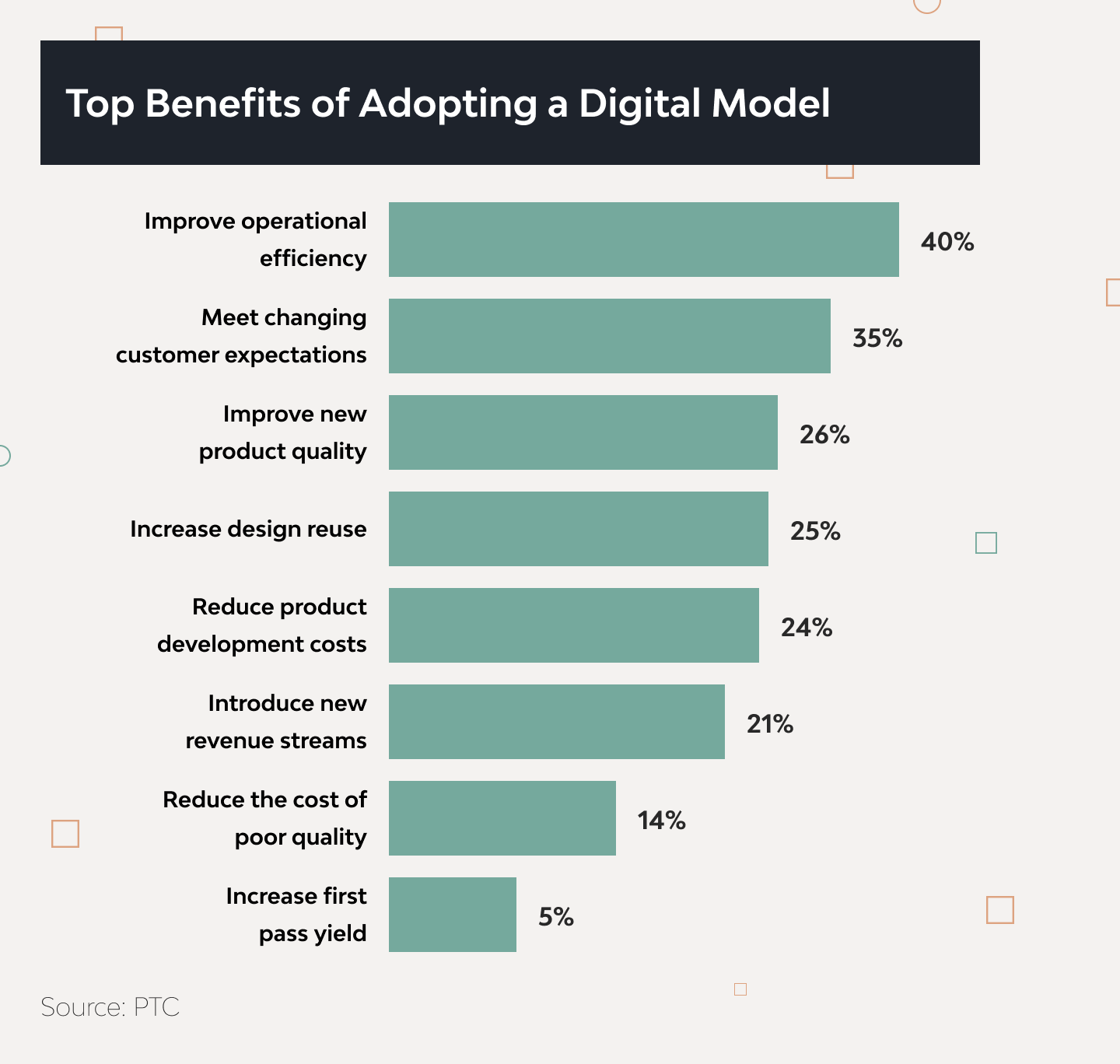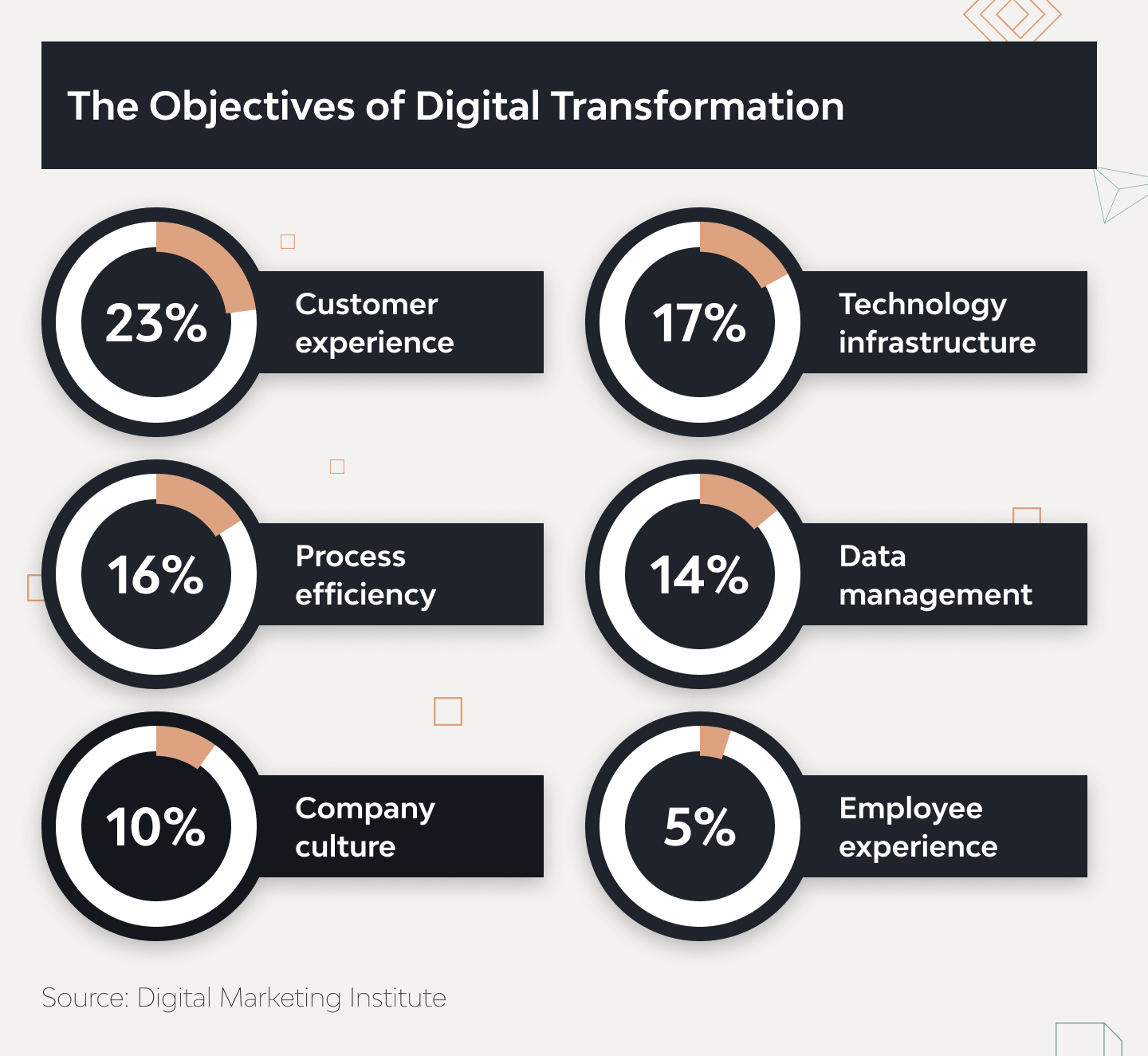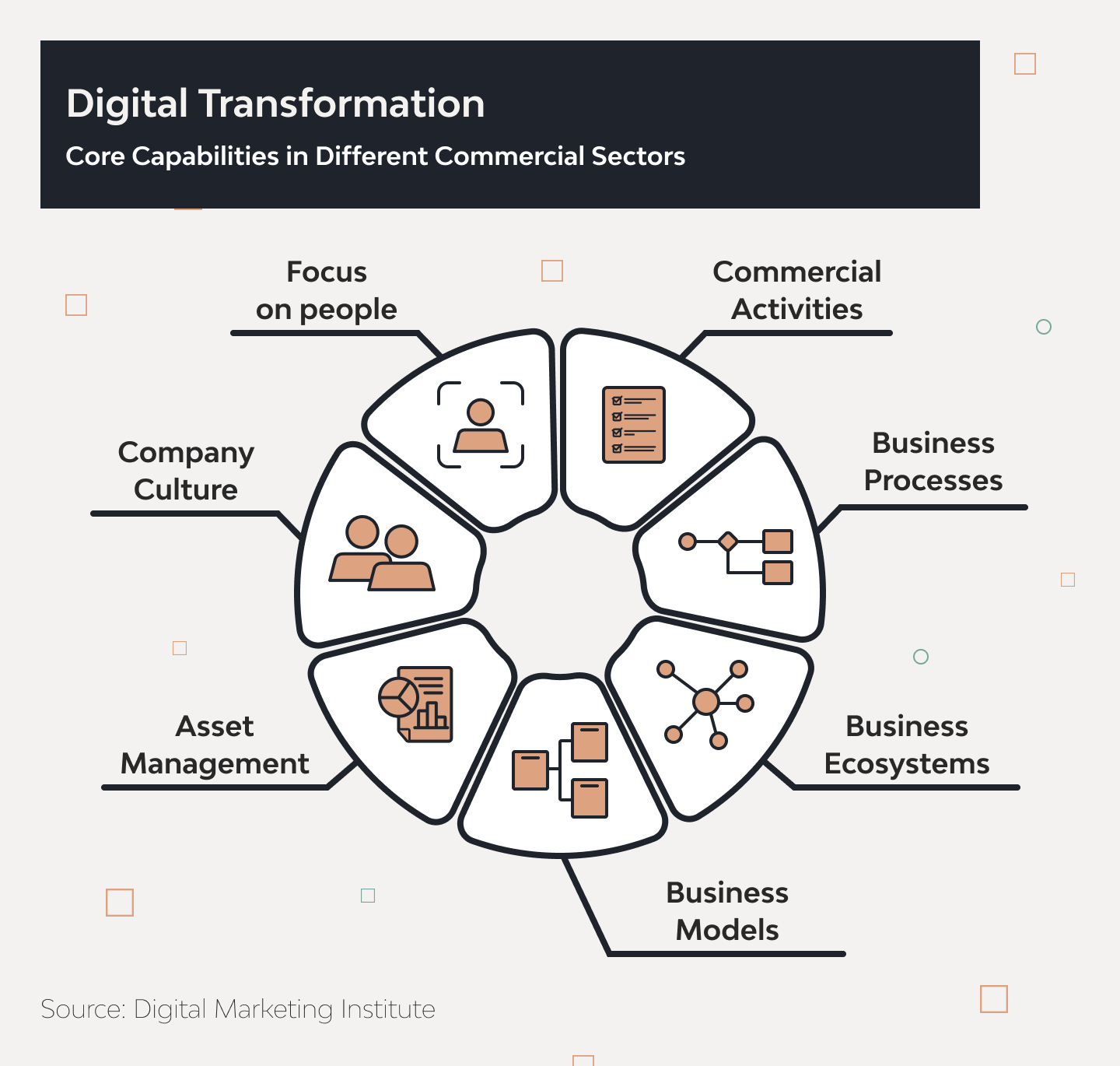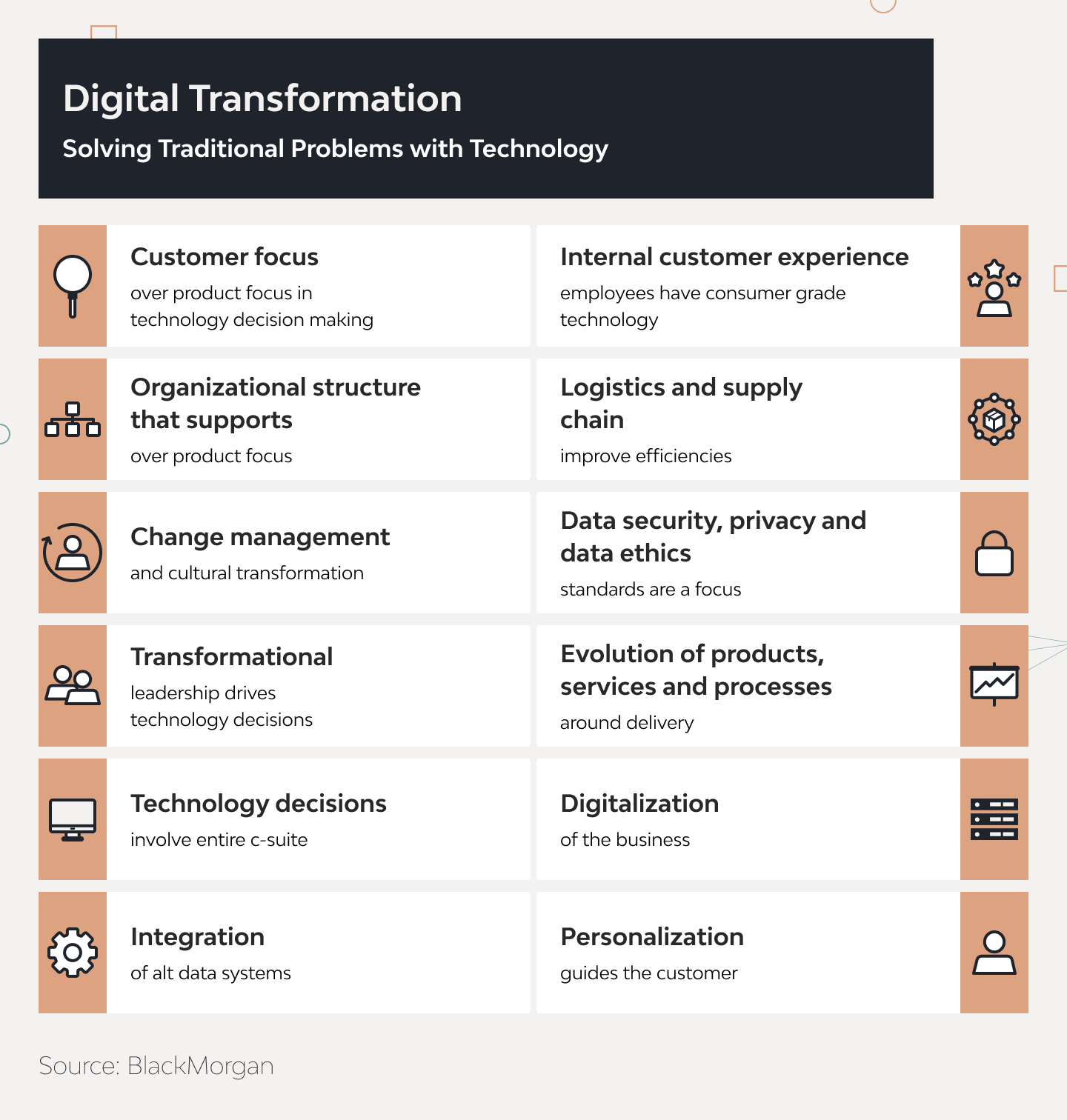Elevate or Stagnate: Embracing Digital Transformation in Business

How does digital transformation help business? It’s more than just a tech upgrade; it’s a radical shift in how businesses operate and deliver value. It involves integrating digital technology into all areas of a business. And it leads to significant changes in culture and operations. This process encourages innovation, challenges the status quo, and adopts novel problem-solving approaches.
Digital transformation reshapes how companies interact with customers and conduct operations. For example, McKinsey’s researches highlight that digitally proactive companies see revenue growth that cannot be underestimated.
The Transformative Tale of Digital Evolution: Benefits of Digital Transformation
The importance of digital transformation is evident in each benefit it offers, as every aspect comes with its own narrative of change and opportunity.

Improved Operational Efficiency
This benefit is about turning the cogs of business faster and more smoothly. Automation stands as the hero in this tale. You may consider Amazon’s journey. Their adoption of warehouse automation is a classic example of how technology can streamline complex processes. It turned a logistical challenge into a seamless operation.
Enhanced Customer Experiences
The importance of digital transformation in business is about creating experiences that are not just satisfactory, but delightfully personalized. Netflix’s recommendation engine is akin to a digital storyteller. It understands individual tastes and curates content that resonates and makes each user feel uniquely understood.
Increased Agility and Adaptability
Digital tools act as a compass that guides businesses through the unpredictable seas of the market. The narrative of many restaurants during the COVID-19 pandemic is a testament to this. They survived by pivoting to digital ordering systems. They managed to continue serving their customers in new and innovative ways.
Data-Driven Decision Making
The spotlight is on making decisions not just with intuition, but with insights born from data. It’s like having a crystal ball but that’s powered by analytics and real-time data. Guesswork is now turned into strategic planning.
Digital Transformation Examples
Boa Lingua: Language Travel with Digital Solutions
Industry: Edtech
Challenge: Modernize Boa Lingua’s platform to enhance customer service and optimize costs. The goal was to streamline their diverse operations and spread them across multiple systems, to improve efficiency and customer engagement.
Solution: Implemented a comprehensive digital transformation strategy:
- A redesigned UX/UI for improved usability.
- A tailored e-commerce application consolidates multiple older systems into one.
- Advanced data management tools for efficient categorization and streamlined administration.
- A custom CRM for marketing automation and personalized customer engagement.
Outcome: Launching a fully-fledged MVP within two years drastically improved user experience and process efficiency. The platform now offers intuitive course searching, detailed information, and personalized support. It greatly enhances the language travel booking experience.
Impact: This transformation has not only streamlined Boa Lingua’s operations but also significantly expanded its digital presence in the market. The new system supports advanced operational automation and provides a robust framework for future market leadership.
PADI Travel: the World of Scuba Diving
Industry: Travel
Challenge: PADI Travel faced the challenge of evolving a basic logbook solution for scuba divers into a comprehensive booking platform.
Solution: The solution involved several key developments:
- Cloud-Based Diving Logbook to track and log diving activities.
- Advanced Dive Trip Planner is integrated with dive computers for enhanced functionality.
- Seamless Transition to PADI Travel into a leading platform for scuba divers worldwide.
Outcome: The project culminated in the successful launch of PADI Travel, establishing it as the world’s foremost platform for scuba divers. This transition marked a significant evolution from a logbook to a global travel booking system.
Impact: PADI Travel’s digital transformation is a prime example of how digital initiatives can broaden the scope of a business. This transformation led to a significant increase in user engagement and expanded the business’s reach in the scuba diving community.
Molo Finance – Digital Mortgage Lending
Industry: Finance & Banking
Challenge: The challenge for Molo Finance was to revolutionize the mortgage industry by transitioning to a completely online lending process. This ambitious goal aimed to disrupt traditional mortgage procedures with a digital-first approach.
Solution: Molo Finance’s solution encompassed several key developments:
- Rapid Online Applications: Enhancing the mortgage application process for speed and ease.
- Quick Decision Making: Utilizing advanced automation for faster loan decisions.
- Personalized Offer System: Implementing systems to provide customized mortgage options to clients.
Outcome: The outcome of these efforts was significant, as Molo Finance raised £270M in funding and processed applications totaling over £600M in 2021, a testament to the efficacy of their digital transformation strategy.
Impact: Molo Finance’s success story demonstrates the transformative potential of digital solutions in traditional industries. Their approach has made mortgage processes faster, more user-friendly, and accessible, setting a new standard in the banking sector.
Advancing Healthcare Through Digital Innovation
Industry: Healthcare
Challenge: The primary challenge was to streamline genetic testing data management which was heavily reliant on manual processes.
Solution: The solution involved developing an application that integrates with Salesforce. This application provided interfaces for data management and automated communication processes.
Outcome: Following the implementation of the digital solution, the company successfully raised an additional $48.5M in capital and demonstrated the project’s efficacy and scalability.
Impact: This case represents a crucial development in healthcare digital transformation, particularly in enhancing data management, processing speed, and overall operational efficiency.
Digital Overhaul in E-commerce for Electrical Parts
Industry: B2B, B2C e-commerce
Challenge: The main challenge was to digitally transform a business that offered a wide range of electrical parts.
Solution: The solution included implementing a custom CRM, AI-driven Quote Management, and Enhanced Customer Information Management.
Outcome: The transformation enabled the company to offer over 1 million electrical parts and represent more than 185 manufacturers.
Impact: This case showcases how digital solutions can significantly improve complex B2B and B2C e-commerce operations, and enhance customer experience and operational efficiency.
Key Components of a Successful Digital Transformation Strategy
The importance of digital transformation in business decision making is a strategic imperative for businesses aiming to stay competitive in an increasingly digital world. A successful digital transformation strategy hinges on several critical components:
1. Specific and Measurable Objectives
The foundation of a successful digital strategy lies in setting specific and measurable objectives that align with the company’s broader goals. These objectives might encompass a range of areas, such as:
- Enhancing customer experience. Digitization creates a more engaging and seamless customer journey.
- Boosting operational efficiency to streamline business processes and reduce inefficiencies.
- Product and service innovation to introduce or improve products and services, staying ahead of market trends.
- Establishing clear KPIs to track progress and adjust strategies to meet evolving business needs.
2. Engaged and Visionary Leadership
Successful digital transformation is driven by leaders who not only endorse but actively champion the digital cause. Leadership roles in this context involve:
- Driving a digital vision for how digital transformation will shape the company’s future.
- Resource mobilization to ensure the availability and optimal use of resources for digital initiatives.
- Fostering a digital culture that embraces digital innovation across the organization.
- Ongoing communication for keeping the entire organization informed about the transformation’s progress and benefits of digital transformation.
3. Strategic Resource Allocation
Resource allocation in digital transformation goes beyond financial investment. It encompasses various aspects such as:
- Budgeting for technology and tools for allocating funds for acquiring state-of-the-art technologies.
- Talent acquisition and upskilling. Bringing in new talent with digital expertise and providing current employees with training to enhance their digital skills.
- Infrastructure Investment for building the necessary digital infrastructure to support new technologies and processes.
- Continuous learning and development for Establishing programs for ongoing skill development to keep pace with technological change.
4. Collaborating with the Right Technology Partners
Choosing the right technology partners is critical to the success of a digital transformation strategy. This involves:
- Selecting vendors with industry expertise. Working with vendors who have a deep understanding of your industry’s unique concept.
- Seeking customizable solutions. Opting for partners that offer solutions tailored to your specific needs.
- Building long-term partnerships. Forming long-lasting relationships with vendors for continued support and adaptation of solutions.
- Ensuring smooth Integration. Making sure that new solutions integrate well with existing systems.
5. Focused Employee Engagement and Training
- Active employee participation in digital initiatives through training and workshops.
- Effective change management to ease the transition to new digital workflows and tools.
6. Utilizing Data for Informed Decisions
- Data analytics for insightful decisions. Harnessing the power of data analytics for informed decision-making and performance monitoring.
- Robust data governance. Implementing strong data governance to ensure data integrity and compliance.
7. Adopting an Agile and Scalable Framework
- Implementing agile methodologies for flexibility and quick adaptation to new trends and technologies.
- Planning for scalability. Ensuring that digital solutions are scalable to accommodate future growth.
8. Maintaining a Customer-Centric Approach
- Understanding customer insights. Regularly collecting and analyzing customer feedback to align digital initiatives with customer needs.
- Personalization strategies. Leveraging digital tools to provide personalized experiences to customers.
Digital Transformation Across Industries
How does digital transformation help businesses and entrepreneurs? Digital transformation has become indispensable to business strategy across various industry sectors. Its impact is far-reaching, driving innovation, efficiency, and customer satisfaction.
Retail Industry
- E-Commerce and Omnichannel Retailing. Retailers are constantly leveraging digital platforms not just to sell products but to create integrated customer experiences across online and offline channels.
- Personalization. Advanced analytics and AI are used to personalize marketing and shopping experiences, enhancing customer engagement.
- Supply Chain Optimization. Digital tools help streamline supply chains, making them more responsive and efficient.
Healthcare Sector
- Telemedicine. Digital platforms enable remote consultations, expanding access to healthcare services.
- Electronic Health Records (EHR). These systems improve the management of patient data, enhancing the efficiency of healthcare delivery.
- Wearable Technology. Wearables and IoT devices are revolutionizing patient monitoring and health data collection.
Finance and Banking
- Mobile Banking and FinTech. Banks and financial institutions are adopting mobile technologies to offer convenient services like online banking, mobile payments, and personalized financial advice.
- Blockchain and Security. The implementation of blockchain technology enhances security and transparency in financial transactions.
- Automated Customer Service. AI-powered chatbots and virtual assistants are being used for customer service and support.
Manufacturing Sector
- Industry 4.0. The integration of IoT, AI, and machine learning is transforming manufacturing operations, leading to increased automation and smarter production processes.
- Supply Chain Automation. Digital tools are being used to optimize supply chains, from procurement to distribution.
- Predictive Maintenance. Using data analytics and IoT for predictive maintenance reduces downtime and maintenance costs.
Education Industry
- E-Learning Platforms. Digital transformation has led to the proliferation of online learning platforms, offering access to education beyond traditional classrooms.
- Adaptive Learning Technologies. AI and machine learning enable personalized learning experiences, catering to individual student needs.
- Virtual and Augmented Reality. These technologies offer immersive learning experiences, making education more engaging.
Transportation and Logistics
- Fleet Management Software. Digital solutions for managing fleets improve efficiency and reduce operational costs.
- Automated Warehousing. Robotics and automation technologies are transforming warehouse operations.
- Real-Time Tracking Systems. GPS and IoT technologies enable real-time tracking of shipments, enhancing transparency and reliability.
Entertainment and Media
- Streaming Services. Digital platforms have transformed how content is created, distributed, and consumed.
- Virtual Reality and Gaming. The use of VR and AR technologies has created new dimensions in gaming and entertainment experiences.
- Data-Driven Content Creation. Analytics tools help in understanding consumer preferences and guiding the creation of targeted content.
Agriculture Industry
- Precision Farming. Utilizing drones, IoT, and data analytics for precision agriculture enhances crop yields and reduces waste.
- Farm Management Software. Digital tools assist in managing farm operations more efficiently.
- Sustainable Practices. Digital technologies support the implementation of sustainable agricultural practices.
Real Estate Sector
- Virtual Property Tours. Augmented and virtual reality technologies enable virtual property showings and tours.
- Property Management Software. Streamlines property management tasks, from tenant screening to maintenance requests.
- Data Analytics for Market Insights. Advanced analytics provide valuable insights into market trends and customer preferences.
Tourism and Hospitality
- Online Booking Platforms. Digital platforms simplify the booking process for travel and accommodation.
- Personalized Customer Experiences. Leveraging data to personalize guest experiences, from tailored travel recommendations to customized room settings.
Digital Concierge Services. AI and machine learning enhance guest services with digital concierge systems.
How can Djangostars help you in the digital transformation process?
At Djangostars, we drive digitalization tailored to each business’s unique needs. Our agile development creates flexible solutions that integrate smoothly with existing systems. We do more than just implement technology. We foster a digital culture within organizations, provide training, and manage change.
Our support is ongoing. We ensure systems stay effective and relevant. We anticipate future digital trends and prepare businesses for long-term growth. Djangostars is a partner in transformation with custom solutions, seamless integration, and dedicated support. This makes us ideal for businesses seeking success in the digital era.
Conclusion
A comprehensive digital transformation strategy is a blend of clear objectives, committed leadership, judicious resource allocation, strategic technology partnerships, employee empowerment, data-driven insights, agility, and customer-focused solutions. When these elements are cohesively integrated, they pave the way for transformative growth and innovation in the digital era.
In conclusion, digital transformation is revolutionizing industry sectors in profound ways. By embracing digital technologies, businesses improve their operational efficiencies. They also create innovative products and services, deliver enhanced customer experiences, and open new avenues for growth and competitiveness in the digital era.
- What role does leadership play in digital transformation?
- Leadership is crucial in digital transformation. They set the vision, drive cultural change, allocate resources, and communicate the transformation's value.
- How do I start the digital transformation process for my business?
- Start by defining specific goals and assessing your current digital capabilities. Create a strategy with technology adoption, resource allocation, and training. Expert guidance can also help.
- Is digital transformation a one-time process, or is it ongoing?
- It's ongoing. Continuously adapting to new technologies and market changes is key to staying competitive.
- How does digital transformation impact customer experience?
- It enhances the customer experience by offering personalized services, efficient interactions, and engaging digital touchpoints.
- Can digital transformation help in reducing operational costs?
- Yes, it can reduce costs by automating processes, and optimizing workflows. The importance of digital transformation in business decision making cannot be underestimated.








